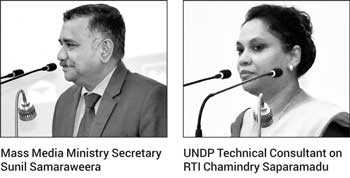Monday Feb 23, 2026
Monday Feb 23, 2026
Saturday, 16 November 2019 00:10 - - {{hitsCtrl.values.hits}}
 The Universal Declaration of Human Rights recognises that freedom of expression includes the ‘right to seek, receive and impart information’. Right to information is therefore a fundamental right and an essential component of a democratic society.
The Universal Declaration of Human Rights recognises that freedom of expression includes the ‘right to seek, receive and impart information’. Right to information is therefore a fundamental right and an essential component of a democratic society.
In Sri Lanka, the right to seek and receive information is a constitutional right guaranteed under Article 14A of Sri Lanka’s Constitution. The Right to Information (RTI) Act which came into full effect by 2017, provides the legal framework within which this fundamental right can be exercised. Unlike other laws that seek to increase the coercive or regulatory power of the State, the Right to Information Act seeks to empower people. Its primary purpose is to shift the paradigm of governance from secrecy to transparency. Hence, the Act provides a key entry point for strengthening transparency and accountability within the Government to address corruption and improve public participation in policy making.
In response to strengthening Right to Information in Sri Lanka, the ‘Right to Information Guiding Manual’ was recently launched by the Ministry of Mass Media. The manual acts as a guide for Information Officers to implement the Right to Information Act in the country. The manual was developed with technical support from the United Nations Development Programme (UNDP) in Sri Lanka.
Further, as part of UNDP’s ongoing support, a pilot project was undertaken to develop an online RTI application tracking system for RTI requests for the Central Environment Authority, with the broader aim of developing a central system accessible by all public institutions. In addition, steps have been taken to restructure the websites of the Vocational Training Authority and the Department of Agrarian Services in accordance with the guidelines and internationally acclaimed standards relating to proactive information disclosure on the Right to Information.
Speaking at the launch, Ministry of Mass Media Secretary Sunil Samaraweera highlighted: “Developing this manual would not have been possible if not for the support provided by UNDP. For the past three years we have been training Government officials on how to implement the Right to Information Act. And now we are working to create awareness among the general public on how they can exercise this fundamental right.”
Adding the relevance of Right to Information in achieving the Sustainable Development Goals, UNDP Technical Consultant on RTI Chamindry Saparamadu mentioned: “UNDP works to ensure inclusive and participatory governance and human development in-line with the 2030 Agenda for Sustainable Development. The right to information is a prerequisite to achieving the Sustainable Development Goals as it enables the public to participate and advocate for meaningful change.”
The launch was attended by former Right to Information Commission Director General Piyathissa Ranasinghe, Vocational Training Authority Director General Chulangani Perera, Department of Agrarian Services Director General W.M.M.B. Weerasekara and Central Environment Authority Director General Hemantha Jayasinghe.